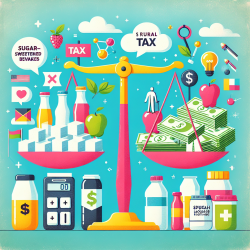Introduction
In the realm of public health, the taxation of sugar-sweetened beverages (SSBs) is a topic of considerable debate. The study titled "Exploring attitudes toward taxation of sugar-sweetened beverages in rural Michigan" provides a detailed analysis of public perceptions regarding this controversial policy. As practitioners in the field of speech language pathology, understanding these perceptions can enhance our approach to health education and advocacy, particularly when working with children and families.
Key Findings from the Study
The study, conducted through semi-structured interviews with 25 adults in rural Michigan, identified four main themes regarding attitudes toward SSB taxation:
- Resistance: Many participants expressed negativity or indifference towards the tax, viewing it as government overreach.
- Unfamiliarity: A significant portion of participants were unaware of the tax or its implications, highlighting a gap in public knowledge.
- Tax Effects: Participants doubted the effectiveness of the tax in reducing SSB consumption, especially among habitual consumers.
- Need for Education: There was a strong desire for tax revenues to be used for health and nutrition education, particularly in schools.
Implications for Practitioners
As practitioners focused on creating positive outcomes for children, these findings offer valuable insights:
- Education and Awareness: The unfamiliarity with SSB taxation underscores the need for comprehensive education initiatives. Practitioners can play a crucial role in developing and delivering educational programs that inform families about the health impacts of SSBs and the rationale behind taxation.
- Advocacy for Policy Change: Understanding public resistance can guide practitioners in advocating for policies that are perceived as fair and effective. Engaging communities in discussions about how tax revenues can be used to support health education can foster greater acceptance.
- Focus on Health Literacy: Enhancing health literacy among children and families can empower them to make informed dietary choices, reducing reliance on SSBs and promoting overall well-being.
Encouraging Further Research
The study highlights the need for further research into public perceptions of SSB taxation across different regions and demographics. Practitioners can contribute to this body of knowledge by conducting local studies and sharing findings with policymakers and the community.
Conclusion
While the taxation of sugar-sweetened beverages remains a contentious issue, it presents an opportunity for practitioners to engage in meaningful education and advocacy. By leveraging the insights from this study, we can work towards policies that support healthier choices and improve outcomes for children and families.
To read the original research paper, please follow this link: Exploring attitudes toward taxation of sugar-sweetened beverages in rural Michigan.










